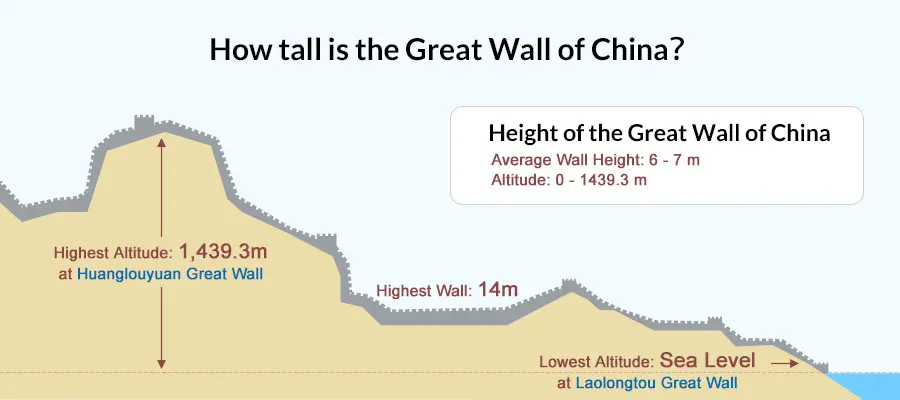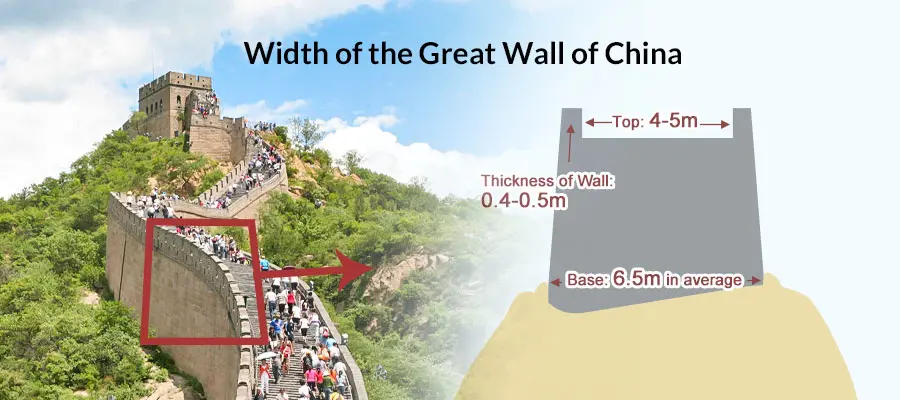How tall is the Great Wall of China?
Average height: 6-7 meters (20-23 feet)
What remains of the Great Wall was mostly built in the Ming Dynasty (1368 – 1644). Its average height ranges from 6 to 7 meters (20 to 23 feet) and the tallest part reaches around 14 meters (46 feet). About the altitude, Huanglouyuan Section is located at the highest altitude, about 1,439.3 meters (4,722 feet), while the lowest point is Laolongtou Section, which is just above the sea level.
 |
What are the heights and altitudes of famous Great Wall Sections?
| Section | Height of Wall | Highest Altitude |
|---|---|---|
| Badaling | 6-9 meters (20-30 feet) | 888.9 meters (2,916 feet) |
| Mutianyu | 6-9 meters (20-30 feet) | 1,039.6 meters (3,410.8 feet) |
| Simatai | Unknown | 986m (3,235 feet) |
| Jinshanling | 5-8 meters (16-26 feet) | Unknown |
| Jiayuguan | 10.7 meters (35 feet) | Unknown |
How can the Great Wall defend against since the wall is not too high?
The fact is that the Great Wall is a complete defensive system instead of a simple wall.
1. First of all, there were some strongholds near the wall. Before the enemies attacked the wall, they needed to clear these strongholds. However, the enemies usually got quite tired when they finished clearing the strongholds. As a result, they were easily defeated or they would go back to have a rest and get their strength back. During this time, the soldiers on the wall would rebuild the firm defensive line.
2. Many sections were built along the mountain ridges. In this case, the enemies could be stopped by these natural barriers at first. Even if they came up, their power would be weakened a lot.
3. Besides, the beacon towers on the wall could give out a warning of approaching enemies, so the soldiers could get ready for the battle beforehand.
4. The top of the wall is wide enough to convey the necessary materials conveniently. The soldiers could also come to the battle fields along the wall quickly, and this enabled the army to defeat the enemies.
5. The Great Wall is the boundary between northern nomadic tribes and the central plain. It can control trade between them. The nomadic people wanted to sell their goods to central plain to make profit, which could in turn strengthen their army. However, the wall limited the economy exchange between these two groups, so that the strength of the nomadic group could be weakened to some degree. This action may attack them at the source.
General width: 4-5 meters (13-16 feet)
Due to the different landforms and military geographical locations, the width of the Great Wall varies. Generally speaking, the width may reach 4 to 5 meters (13 to 16 feet) at the top, which allows at least four horses to pass through at the same time. This design is beneficial for the soldiers to convey the provisions and weapons when they have battles. The average width of the base is about 6.5 meters (21 feet). The design of wider base makes the wall more solid. The wall itself on the top usually measures 0.4-0.5 meters (1.3-1.6 feet) thick.
 |
What are the widths of famous Great Wall Sections?
| Section | Width of Wall |
|---|---|
| Badaling | Top: 4.5-5.8 meters (15-19 feet) Base: 6.5-7.5 meters (21-25 feet) |
| Mutianyu | Top: 4 to 5 meters (13-16 feet) |
| Juyongguan | Widest Top: 16.7 meters (55 feet) Narrowest Top: 1.2 meters (4 feet) |
Further Reading
- Last updated on May. 24, 2023 -